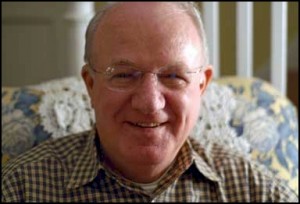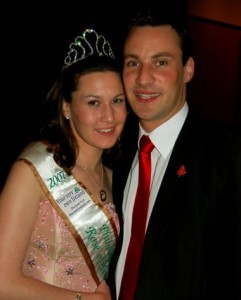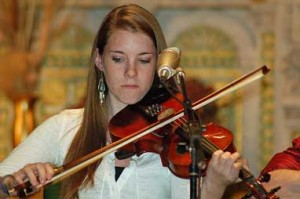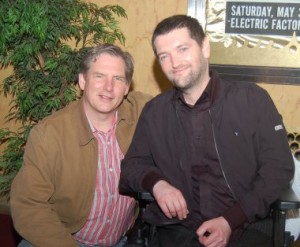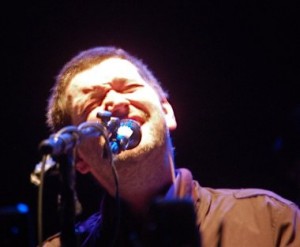There is nothing that warms my sentimental heart more than hearing an Irish tenor sing “Danny Boy.” I know it’s old-fashioned and maybe syrupy enough to have diabetics reaching for their insulin, but I say this as someone who divided her teenage devotion between the Beatles and the Rolling Stones, loved Judy Collins and Pink Floyd, and blames the perpetual ringing in her ears on a Grateful Dead concert and the Clancy Brothers’ tape that circled endlessly in her Walkman. Eclectic is my middle name. And hearing an Irish tenor (or even Sinead O’Connor) sing “Danny Boy” always makes me cry.
So when I recently talked to Ciaran Nagle, one of the “Three Irish Tenors,” who will be performing on July 17 at the Colonial Theatre in Phoenixville, I had to know what songs these three classically trained singers would be performing.
It’s in there. The Three Irish Tenors sing “Danny Boy” along with many old tunes such as John McCormack’s “Macushla” (a poignant song with such staying power that Rufus Wainright performs it in live performances); the fast-paced 19th century traveling song, “The Rocky Road to Dublin; “When Irish Eyes are Smiling;” “The Donkey Serenade”; and even some of homeboy Mario Lanza’s standards.
The Mario Lanza-John McCormack songs are part of a medley the Three Irish Tenors commissioned several years ago when they performed at a Fourth of July event with singer Neil Diamond in Dublin’s Phoenix Park. “We allowed him to come on and support us,” jokes Nagle, who is one of the founding members of this group which should not be confused with The Irish Tenors (its most famous member being Ronan Tynan).
“So,” I said, “this means there are actually six Irish tenors.”
“Six?” he retorted. “There are about 6 million Irish tenors. There are two, arguably three principal groups out of Ireland. Each has had great success in the States and Canada, all have had shows on PBS, all have survived and been successful at selling out houses, and we all know each other pretty well. There’s room for everybody. Fortunately.”
The Irish tenor biz is a small one, says Nagle, so when one tenor drops out, there’s always another to take his place. The Three Irish Tenors started in 2000 when a promoter called and asked if he’d be interested in doing “tenor gigs.”
“I’d come straight from performing in Riverdance and I was delighted with the idea,” says Nagle. “The original group were all friends of mine, people I’d sung with in the National Chamber [National Chamber Choir, Ireland’s only professional chorus] and Opera Ireland. Originally, we only had a handful of dates for particular occasions. The first was the opening of a new theater in Armagh. We thought there wasn’t going to be any future in it. The Irish Tenors already existed. We didn’t believe it was going to take off and, lo and behold, it did.”
At their first gig in Armagh, they got a standing ovation at intermission. “That was quite outstanding,” said Nagle. “We were having a great laugh up there, here we were doing this and it didn’t feel like work, we’d decided on the program the week before, so we were over the moon. Then it snowballed. We were touring the country for a period of time then six weeks after our incarnation we got a call from a U.S. producer who said, ‘We have a tour lined up. Do you want to perform in it.’ Well, what were we going to say: ‘The Guinness isn’t as good over in America and, unless it’s better, we’re not going?’”
They went and have been coming back once or twice a year ever since selling to packed houses.
The current incarnation of The Three Irish Tenors includes Kenneth O’Regan and Des Willoughby. “Kenneth has one of the biggest, most beautiful voices I’ve ever heard,” says Nagle. “I knew him from Riverdance and we would meet up more on a social basis. When an opening came up and I said, ‘Kenneth, would you be interested,’ he said, ‘Absolutely, it sounds like a lot of fun.’ We don’t do open auditions and then try to make the person fit. The personalities have to work. Des Willoughby has a gorgeous, gorgeous voice, and the chemistry between the three of us is smashing. “
And, as you can probably tell, despite their classical training, their performing style bears no relation to a concert hall recital. There are no white shirts and tails, and there’s plenty of onstage—and offstage—banter.
“The more clapping and shouting and jeering and comment, whatever, we welcome that,” says Nagle. “We interact with our audience. God help you if you’re sitting anywhere near the front, and I will say no more!”
And that, he says, is the key to the Three Irish Tenors’ success. “The audience will always say, ‘you guys look like you’re having an absolutely fantastic time up there, ‘ and we are. The day it becomes a job to me, the day I don’t enjoy it, that’s it, I’ll close the door, and it’s over.”
The Three Irish Tenors will be performing on July 17, at 8 p.m., at the Colonial Theater in Phoenixville. Tickets start at $29.95.
On Friday, July 18, starting at 6 p.m., the group will entertain at a benefit for the Drexel Neuman Academy and LaSalle Academy, both independent Catholic schools, at the home of Theresa and Paul Murtagh in Media. The $150 individual ticket price includes cocktails, dinner, and a concert. For more information about the benefit, contact irishconcert@yahoo.com or call (610) 496-7390.

